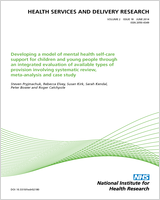NCBI Bookshelf. A service of the National Library of Medicine, National Institutes of Health.
Cunningham M, France EF, Ring N, et al. Developing a reporting guideline to improve meta-ethnography in health research: the eMERGe mixed-methods study. Southampton (UK): NIHR Journals Library; 2019 Feb. (Health Services and Delivery Research, No. 7.4.)

Developing a reporting guideline to improve meta-ethnography in health research: the eMERGe mixed-methods study.
Show detailsThe eMERGe project aimed to create evidence-based meta-ethnography reporting guidance by answering the following research questions:
- What are the existing recommendations and guidance for conducting and reporting each process in a meta-ethnography, and why?
- What good practice principles can we identify in meta-ethnography conduct and reporting to inform recommendations and guidance?
- From these good practice principles, what standards can we develop in meta-ethnography conduct and reporting to inform recommendations and guidance?
- What is the consensus of experts and other stakeholders on key standards and domains for reporting meta-ethnography in an abstract and main report/publication?
The project comprised four key stages, conducted by the project team, in consultation with one of the originators of meta-ethnography, Professor George Noblit, and supported by a Project Advisory Group of national and international academics, policy experts and lay advisors who had an active role in the development of the guidance and whose contribution was central throughout the project. The process of guidance development across the four stages of the project is outlined in Figure 2.

FIGURE 2
Guidance development flow chart.
Stage 1 of the project involved a systematic review of methodological guidance using comprehensive literature searches. The methods and results of the review are provided in Chapter 3. From this review, good practice principles and recommendations were identified.
Stage 2 of the project involved a review and audit of published meta-ethnographies. There were three parts to this stage of the project: (2.1a) a documentary analysis of a sample of published seminal and poorly reported meta-ethnographies; (2.1b) an exploration of professional end-user views on the utility of seminal and poorly reported meta-ethnographies for policy and practice; and (2.2) an audit of published health- or social care-related meta-ethnographies to identify the extent to which they met the good practice principles and recommendations identified in stages 1, 2.1a and 2.1b. This stage of the project is reported in Chapter 4. As a result of stage 2, we reviewed and refined 109 provisional standards to create 69 reporting items for the eDelphi studies.
Stage 3 of the project involved finding consensus on the reporting items through an online workshop and eDelphi (Version 1, Duncan E, Swinger K, University of Stirling, Stirling, UK) consensus studies. Stage 3 of the project is reported in Chapter 5. As a result of the eDelphi consensus studies, four items failed to reach consensus and were removed from the provisional standards.
Stage 4 of the project covered developing the guidance table, reporting criteria, explanatory notes and extensions to the guidance,39–42 along with training materials to support the use of the guidance. This process was iterative and involved input from the project team and the wider Project Advisory Group. This process is described in Chapter 6.
- Aims of the project - Developing a reporting guideline to improve meta-ethnograp...Aims of the project - Developing a reporting guideline to improve meta-ethnography in health research: the eMERGe mixed-methods study
Your browsing activity is empty.
Activity recording is turned off.
See more...